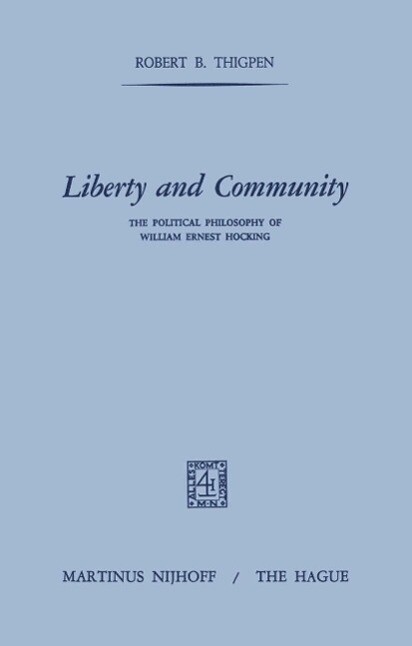
Sofort lieferbar (Download)
This study of the political philosophy of William Ernest Hocking be gan as a doctoral dissertation at Tulane University. Hocking (1873- 1966) was for many years Alford Professor of Natural Religion, Moral Philosophy, and Civil Polity at Harvard University. Although he is relatively well-known among American philosophers, particularly by students of metaphysics and the philosophy of religion, very little atten tion has been given to his political philosophy. Some general studies of his thought summarize his political writings in a very cursory fashion, but they do not discuss his contributions in detail or relate them to significant issues in political philosophy. Most important general works on modern political philosophy or American political thought do not even mention Hocking; a few note his name in passing. Because he is almost completely unknown in the social sciences, the original purpose of this study was to explore, systematize, and present his extensive writings in political philosophy. It then became apparent that his entire political philosophy is oriented around the concepts of liberty and community. When his thought is analyzed in terms of these themes, its unity and coherence are more obvious. Moreover, his writings become more significant when they are related to liberty and community, for these are focal concepts for important problems in modern political philosophy. This study of Hocking's political philosophy will, it is hoped, help us to see how liberty and community can be more understandable, attainable, and compatible with one another.
Inhaltsverzeichnis
Liberty and Community as Problems. - Hocking s Life and Work. - Liberty and Community as Themes in Hocking s Political Philosophy. - I: Perspectives on the Study of Man. - The Approach of Political Philosophy. - The Broadened Empiricism: Critical Statement. - The Broadened Empiricism: Constructive Statement. - The Basic Ethical Standard: Human Potentiality. - II: The Free and Social Self. - The Challenge of Social Thought. - Freedom, Personal Unity, and the Will. - Sociality. - Society and the Individual. - III: The Political Community. - The State as a Problem. - The Origin of the Political Community. - The Purpose of the Political Community. - The Political Community as a Will Circuit. - Sovereignty. - IV: Individual Rights and Community Responsibilities. - Ways of Thinking About Rights. - Presumptive Right and Social Duty. - The Reformulation of Liberalism. - Political Participation and Leadership. - The Freedom of Expression. - V: Liberty and Community in International Relations. - Ethics and International Relations. - Securing International Peace. - Concluding statement. - Selected bibliography of William ernest hocking.
Produktdetails
Erscheinungsdatum
06. Dezember 2012
Sprache
englisch
Auflage
1972
Seitenanzahl
127
Dateigröße
24,07 MB
Autor/Autorin
R. B. Thigpen
Verlag/Hersteller
Kopierschutz
mit Wasserzeichen versehen
Produktart
EBOOK
Dateiformat
PDF
ISBN
9789401027984
Entdecken Sie mehr
Bewertungen
0 Bewertungen
Es wurden noch keine Bewertungen abgegeben. Schreiben Sie die erste Bewertung zu "Liberty and Community" und helfen Sie damit anderen bei der Kaufentscheidung.









